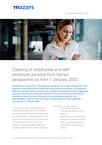Download newsletter
3 November 2021
Pursuant to the Labor Code, the employer is obliged to provide catering to the employees who worked more than 4 hours during the within the workplace itself, in close proximity to it or to provide a financial contribution for meals. If the work shift lasts more than 11 hours, the employer may provide additional catering or provide an additional financial meal contribution.
The financial contribution is not another form of catering, but it is its alternative.
The employer provides catering:
- in the own catering facility;
- in the catering facility of another employer;
- by providing meal vouchers that employees can apply with a legal entity or a natural person who is authorized to provide catering services.
According to the Labor Code, the employer is obliged to contribute to the employee for meal in the amount of:
- at least 55% of the price of the meal;
- a maximum of 55% of the meal allowance for a business trip lasting 5 to 12 hours.
In the case of meal vouchers, the value of the meal is represented by the value of the meal voucher respectively in the case of electronic meal vouchers, the value credited by the employer to the meal card. The value of the meal voucher may not be less than 75% of the meal allowance for a business trip lasting 5-12 hours. For a financial contribution, the value of employer’s contribution must be the same as for non-monetary forms of catering.
Above the obligations set by the Labor Code, an employer may, upon his decision, contribute to catering as well:
- from the resources of the social fund, depending on the amount of the created social fund, as follows from the wording of the Labor Code;
- with a "voluntary" contribution.
The wording of the Income Tax Act effective until the end of 2021 did not refer to the Labor Code in provisions concerning the non-monetary form of catering. This implied that until the end of 2021, the value of a meal provided in non-monetary was in full amount exempt from income tax of employee. The reference to the Labor Code was stated only in case of a financial contribution for meals which means that if the employer also contributed with a "voluntary" contribution to the financial contribution for meals, till the end of 2021 such amount represented the employee's taxable income.
Changes in taxation in 2022
From 1 January 2022, inequality in taxation of various forms of the employer's contributions to employees' catering was eliminated. Exemption from tax for an employee only up to the legal limit set by the Labor Code is uniform for all forms of catering (provision of meals in own catering facility / catering facility of another employer, meal voucher, financial meal contribution). The contribution exceeding the limit set by the Labor Code is the taxable income of the employee both when providing a financial contribution for meals and when providing a meal voucher to the employee.
For employer, a "voluntary" meal contribution can be considered as a tax expense only if it is considered ad an employee benefit that is regulated in an internal guideline or agreed in a collective agreement, employment contract or other agreement between the employee and the employer and is also subject to employee income tax from dependent activity and subject to related social and health contribution levies.
| Employee | Employer |
Contribution according the Labor Code (55 %) | Exempt income | Tax-deductible cost |
Social fund contribution | Exempt income | Tax-deductible cost at the moment of SF creation |
Voluntary contribution | Taxable income | Tax non-deductible cost* |
*If the voluntary contribution is not specifically regulated in a collective agreement, internal regulation, employment or other agreement concluded between the employee and the employer in accordance with the Labor Code.
Following the above changes, we would like to draw your attention to the tax newsletter published in November 2021 focusing on the issue of topic of non-monetary benefits. It will help you better understand the related tax implications for employees and your organization.
We recommend you to consider setup and applied non-monetary benefits in your organization. Alternatively, feel free to contact your Mazars contact person.
The obligation to provide catering "in advance" remains unchanged
In situations when the employer provides meal vouchers or a financial contribution retrospectively for the past days of the month the tax treatment remains valid also for 2022. In relation to the provision of meal vouchers/financial contribution for past days, such a procedure is considered a breach of the obligation to provide meals for employees arising from the Labor Code and the associated costs can not therefore be considered an employer's tax-deductible expense.
Catering of self-employed persons from 1 January 2022
In order to reduce the administrative burden, a change was introduced. Based on this change taxpayers with income according to Article 6 par. 1 and 2 of the Income Tax Act (self-employed persons) who apply provable tax-deductible expenses, will not have to prove the incurring expenditures on meal or meal vouchers by invoice or cash receipt. Thus, self-employed persons will be able to include catering expenses in tax-deductible costs even without a specific document.
At the same time, there is a change in the amount that can be recognized as a tax-deductible expense for self-employed persons. From 1 January 2022, there is a significant reduction in the applicable meal expenses of these taxpayers from the current 100% of the meal allowance for a business trip lasting 5-12 hours to 55%, and thus an increase in their tax burden.











